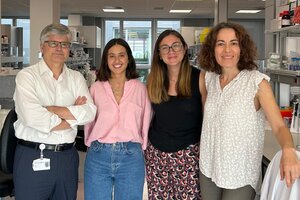A study led by SJD identifies new therapeutic targets for Ewing sarcoma
An international team led by the Institut de Recerca Sant Joan de Déu (IRSJD), the Pediatric Cancer Center Barcelona of the SJD Barcelona Children’s Hospital, and the Centre for Genomic Regulation (CRG) has identified two enzymes, KDM6A and KDM6B, that play a fundamental role in the development of Ewing sarcoma, one of the most aggressive sarcomas in children, adolescents, and young adults.
Ewing Sarcoma
Ewing sarcoma is a rare malignant tumor that originates in the bones and soft tissues surrounding the bone, mainly affecting children and adolescents. It is characterized by high aggressiveness and, despite advances, the prognosis remains limited, especially in cases of relapse or metastasis, where there is an urgent need for new specific treatments.
Ewing sarcoma is not a cancer caused by multiple mutations as occurs in many adult tumors. The main cause is a specific genetic alteration: a chromosomal translocation where two parts of different chromosomes abnormally join and generate a fusion gene called EWSR1::FLI1. This gene produces a "hybrid" protein that acts as a faulty switch, turning genes on or off uncontrollably, triggering tumor growth.
Since Ewing sarcoma presents few mutations, it is difficult to find specific targeted drugs. Therefore, current research focuses on better understanding the epigenetic and molecular mechanisms, such as the role of the proteins KDM6A and KDM6B, to develop more precise and less aggressive treatments.
Demethylases KDM6A and KDM6B
The study KDM6 Demethylases Contribute to EWSR1::FLI1-Driven Oncogenic Reprogramming in Ewing Sarcoma, published in the journal Cancer Research, reveals that these enzymes act as essential collaborators of the fusion protein EWSR1::FLI1, the main tumor driver of Ewing sarcoma. Researchers have found that inhibiting KDM6A and KDM6B significantly reduces tumor growth in preclinical models, pointing to their potential as therapeutic targets.
"Our research shows that these enzymes, which modulate the epigenome, are key pieces in the activation of the oncogenic program and may become targets for future drugs," explains Dr. Sara Sánchez-Molina, principal investigator of the study at IRSJD.
The team validated the results using preclinical mouse models, where the inactivation of KDM6A or KDM6B caused a significant reduction in tumor growth and an increase in survival. Moreover, the study highlights that the epigenetic inhibitor GSK-J4 could reproduce the effects of KDM6B loss, reinforcing its therapeutic potential.
For Dr. Jaume Mora, scientific director of the Pediatric Cancer Center Barcelona, head of the Sarcomas and Histiocytosis group at IRSJD and senior co-author, "this work reinforces the commitment to translational research in pediatric oncology, with the aim of developing more specific and less toxic treatments for affected children and adolescents."
Impact and Collaborations
This research has been made possible thanks to the collaboration of IRSJD with national and international research centers, including the Centre for Genomic Regulation (CRG), the IRB Barcelona, and the University of Lausanne.

Ewing sarcoma is not a cancer caused by multiple mutations as occurs in many adult tumors.
